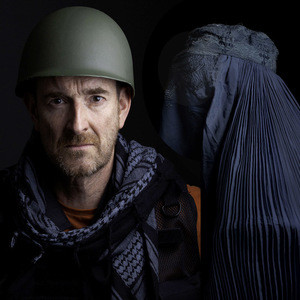Afghanistan is Not Funny
Written and performed by Henry Naylor. Directed by Martha Lott. The Studio. Holden Street Theatres. Adelaide Fringe. March 5 2022.
Reviewed by Peter Wilkins
Henry Naylor gives a brilliant performance in his play Afghanistan is not Funny. He recounts with fervent vitality and striking authenticity the events that led up to and included his visit to Afghanistan to research and gather material for his play Finding bin Laden that he was devising for the Edinburgh Festival. Previous visitors to the Holden Street Theatres will recall Naylor’s earlier triumphs such as Angel, the heart-wrenching tale of female Kurdish sniper Rehana, the angel of Kobana and Games that explored prejudice in the 1936 Berlin Olympics. Formerly a stand-up comedian and highly successful comedy writer, Naylor does not shirk from tackling confronting issues and embarking on a campaign to raise the awareness of his audience. In Afghanistan is Not Funny, Naylor combines sharp hitting humour with heart wrenching accounts of life in war torn Afghanistan.
The recent return of the Taliban and the chaos and terror that that evoked in 2021 prompted Nayor to recall his own experiences and his journey from a comedy actor dressing up as an animal for TV commercials to his job as a comedy writer for the BBC and his proposal to the taste sensitive BBC to write a play about the war for the BBC Comedy Hour. “Afghanistan is not funny!” his producer tells him, but prompted by his cameraman mate Phil, who had served in Afghanistan and his photographer friend Sam Maynard, Naylor was persuaded to visit Afghanistan to research his play Finding Bin Laden.
Comedy and Tragedy are the masks of drama, the two sides of the same human experience and Naylor is the master of their duality. Alone on stage he peoples his world with the leading characters of his drama. With mercurial alacrity, he switches from Phil to Sam, from BBC producer to Denise, the therapist, leading him through his debrief to his Afghan guide, Houmein, a qualified surgeon, embassy staff, a war lord, the Mujhadeen who threaten his life, a war crazed colonel, and Hugh Grant and Stephen Frears who show an interest in his film script. Throughout, Naylor takes his audience on a journey of awakening. Irony and absurdity stride hand in hand with the graphic account of the dangers and horrors of war. Naylor’s comic artistry and passionate humanity coexist at the very heart of his performance, and the audience is swept along by his masterful ability to make us laugh one moment , feel a surge of anger at the next, and be gripped by his extraordinary story. Moments of tension such as an officer’s panicked voice fearing a car bomb is broken swiftly by a quip, an inflection or an instant of relief. This is Naylor’s talent as a performer and a playwright. It is also the belief in the journey to entertain, to educate and to make a difference. For a little over an hour, the audience is carried along by Naylor’s personal experience. This is real. This is a man’s life, his own true stories as truth and reality have informed previous plays by a playwright who has the power to persuade and involve. It is not surprising that his audience would spontaneously leap to their feet to give Naylor a standing ovation.
Naylor finds his dramatic arc through the therapist’s four stages of personal development that form the structure of the scenes that follow each phase of Unconscious Incompetence, Conscious Incompetence, Unconscious Competence and Conscious Competence. Realization dawns through each phase, and the stark reality of war and its consequences have changed Naylor’s life irrevocably. Humour fades into the images of Maynard’s photographs that underscore Naylor’s enactment of his journey. They are graphic, disturbing, provocative and we are left with the impression of war’s woeful irony. Has nothing changed? Naylor’s powerful and riveting performance and the audience’s perception has changed. Finding Bin Laden has been cast aside as failing to reflect true empathy and Afghanistan is Not Funny has addressed the conflict of indifference and empathy.
Martha Lott’s assured direction never allows the action to flag. Her vision is in perfect step with Naylor’s superbly crafted play and together they lead the audience to their epiphany. As we gaze at the final doleful image of a young girl holding an inert and wrapped bundle we are shocked into a profound awareness of the effect of war on ordinary people. It is particularly upsetting as Russian missiles storm down on the innocent people of Ukraine. It lends a tragic and prophetic footnote to Naylor’s immediate and important play.
Henry Naylor’s Afghanistan is Not Funny vanquishes indifference and arouses a dynamic sense of empathy that remains long after one leaves the theatre. Does it make a difference? For any audience member who is fortunate enough to see Afghanistan is Not Funny, like Naylor they will also be changed forever.
Henry Naylor’s Afghanistan is Not Funny vanquishes indifference and arouses a dynamic sense of empathy that remains long after one leaves the theatre. Does it make a difference? For any audience member who is fortunate enough to see Afghanistan is Not Funny, like Naylor they will also be changed forever.
